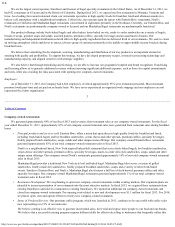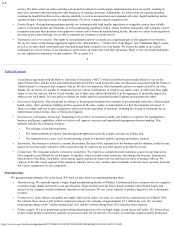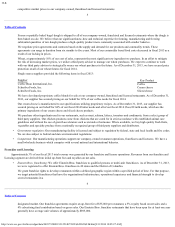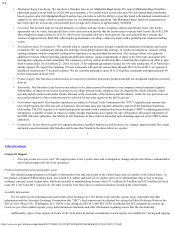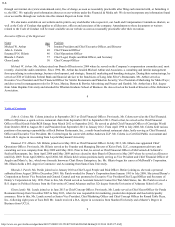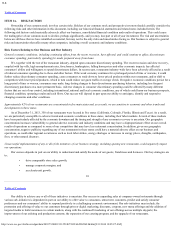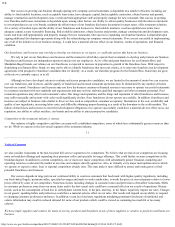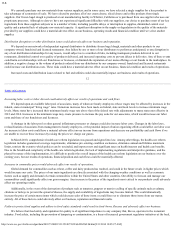Einstein Bros 2013 Annual Report Download - page 14
Download and view the complete annual report
Please find page 14 of the 2013 Einstein Bros annual report below. You can navigate through the pages in the report by either clicking on the pages listed below, or by using the keyword search tool below to find specific information within the annual report.
10-K
http://www.sec.gov/Archives/edgar/data/949373/000119312514073832/d629623d10k.htm[9/11/2014 10:05:27 AM]
certain hazardous or toxic substances on or in such property. Such liability may be imposed without regard to whether the owner or operator knew
of, or was responsible for, the presence of such hazardous or toxic substances. Although we are not aware of any environmental conditions that
require remediation by us under federal, state or local law at our properties, we have not conducted a comprehensive environmental review of our
properties or operations. We may not have identified all of the potential environmental liabilities at our properties, and any such liabilities that are
identified in the future may have a material adverse effect on our financial condition. Moreover, the adoption of new or more stringent
environmental laws or regulations could result in a material liability to us and the current environmental condition of our leased properties could be
harmed by third parties or by the condition of land or operations in the vicinity of our leased properties.
We may not be able to protect our brands, trademarks, service marks and other proprietary rights.
Our brands, which include our trademarks, service marks and other proprietary rights, are important to our success and our competitive
position. Accordingly, we devote substantial resources to the establishment and protection of our brands. However, the actions we take may be
inadequate to prevent imitation of our products and concepts by others, to prevent various challenges to our registrations or applications or denials
of applications for the registration of trademarks, service marks and proprietary rights in the U.S. or other countries, or to prevent others from
claiming violations of their trademarks and proprietary marks. In addition, others may assert rights in our trademarks, service marks and other
proprietary rights or may assert that we are infringing rights they have in their trademarks, service marks, patents or other proprietary rights.
A regional or global health pandemic could severely affect our business.
A health pandemic is a disease that spreads rapidly and widely by infection and affects many individuals in an area or population at the same
time. If a regional or global health pandemic were to occur, depending upon its duration and severity, our business could be severely affected. We
have positioned ourselves as a “neighborhood atmosphere” between home and work where people can gather for human connection and high
quality food. Customers might avoid public gathering places in the event of a health pandemic, and local, regional or national governments might
limit or ban public gatherings to halt or delay the spread of disease. A regional or global pandemic might also adversely impact our business by
disrupting or delaying production and delivery of products and materials in our supply chain and causing staff shortages in our restaurants. The
impact of a health pandemic might be disproportionately greater on us than on other companies that depend less on the gathering of people in a
neighborhood atmosphere.
16
Table of Contents
The loss of key personnel or difficulties recruiting and retaining qualified personnel could adversely affect our business and financial results.
Our success depends substantially on the contributions and abilities of key executives and other employees, and on our ability to recruit and
retain high quality employees to work in and manage our restaurants. We must continue to recruit, retain and motivate management and other
employees sufficient to maintain our current business and support our projected growth. A loss of key employees or a significant shortage of high
quality restaurant employees to maintain our current business and support our projected growth could adversely affect our business and financial
results.
Our ability to use net operating loss carryforwards to offset future taxable income for U.S. federal income tax purposes would be limited if an
ownership change occurs.
In general, under Section 382 of the Internal Revenue Code (“§382”), a corporation that undergoes an “ownership change” is subject to
limitations on its ability to utilize its pre-change net operating loss (“NOL”) carryforwards to offset future taxable income. A corporation generally
undergoes an “ownership change” when the stock ownership percentage (by value) of its “5 percent stockholders” increases by more than 50
percentage points over any three-year testing period. Greenlight, our largest stockholder, reduced its beneficial ownership in us from 63% as of
January 1, 2013 to 38% as of December 31, 2013.
Due to transactions involving the sale or other transfer of our stock from the date of our last ownership change through the date of the latest
secondary public offering of our common stock by Greenlight, and changes in the value of our stock during that period, any new offerings or
transfers may result in an additional ownership change for purposes of §382 or significantly increase the likelihood that we will undergo an
additional ownership change in the future (which could occur as a result of transactions involving our stock that are outside of our control). In such
event, the occurrence of an additional ownership change would limit our ability to utilize approximately $75.1 million of our NOL carryforwards
that are not currently subject to limitation, and could further limit our ability to utilize our remaining NOL carryforwards and possibly other tax
attributes. Limitations imposed on our ability to use NOL carryforwards and other tax attributes to offset future taxable income could cause us to
pay U.S. federal income taxes earlier than we otherwise would if such limitations were not in effect, and could cause such NOL carryforwards and
other tax attributes to expire unused, in each case reducing or eliminating the benefit of such NOL carryforwards and other tax attributes to us and
adversely affecting our future cash flow. Similar rules and limitations may apply for state income tax purposes as well.
Failure of our internal controls over financial reporting could harm our business and financial results.


